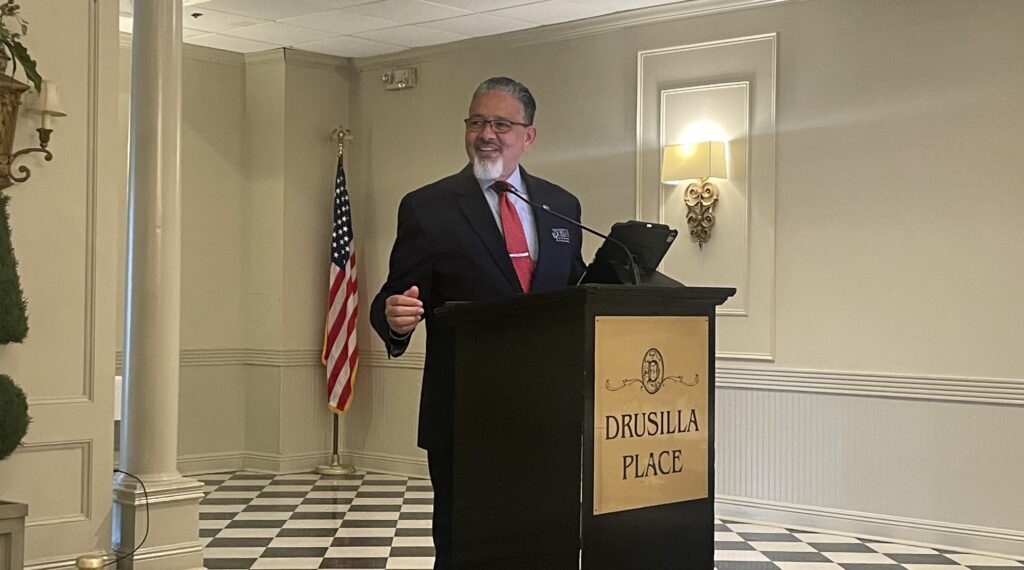News from the South - Louisiana News Feed
‘Solar for Y’all’ faces hazy future in Louisiana

‘Solar for Y’all’ faces hazy future in Louisiana
by Elise Plunk and Halle Parker, WWNO, Louisiana Illuminator
March 18, 2025
The future of millions of dollars in funding to help low-income Louisiana residents access solar energy has grown increasingly uncertain as the Trump administration attempts to slash grant programs awarded under its predecessor.
Last year, the state was given $156 million of Inflation Reduction Act funding to launch Louisiana’s Solar for All program, dubbed Solar for Y’all by the Louisiana Department of Energy and Natural Resources (LDENR). The money is expected to boost development of rooftop or community solar for residences and apartment buildings. It will also help fund more solar-powered resilience hubs to provide safe havens after hurricanes.
The program is “designed not only to put solar on people’s rooftops who couldn’t otherwise afford it, but also to invest in communities and invest in homes,” said Logan Burke, executive director for the Alliance for Affordable Energy, a utility watchdog group. “There’s a desperate need for that investment in Louisiana.”
Solar for All is one of three grant programs created to comply with Congress’s creation of the $27 billion Greenhouse Gas Reduction Fund. The IRA directed the Environmental Protection Agency (EPA) to spend $7 billion on grants to help low-income and disadvantaged communities install or benefit from technology that produces zero climate-warming emissions, specifically mentioning rooftop solar.
Of the three grant programs, only Solar for All has survived so far. On March 11, EPA Administrator Lee Zeldin announced he had canceled the other two programs, terminating $20 billion worth of contracts. Zeldin claimed his office had documented “incidents of misconduct, conflicts of interest and potential fraud” that hurt the programs’ integrity. However, a collective of former EPA employees say there hasn’t been substantial evidence of the claim.
“Any instability in an expected funding mechanism throws businesses,” said Burke, adding that such projects have wide-ranging economic benefits.
So far, the LDENR is still crafting its plan for the state program. That plan will then go before the EPA for approval before being implemented.
GET THE MORNING HEADLINES.
Sweeping cuts
Since Trump took office Jan. 20, the EPA has canceled more than 400 contracts the Biden administration awarded under the 2022 Inflation Reduction Act.
LDENR spokesman Patrick Courreges said the state agency’s preparation to launch the program hasn’t been disrupted. Despite the noise, he said they were proceeding as normal.
“We’re not blind or deaf. We know what’s out there, but at the moment all we’ve got to work with is the current status,” Courreges said, noting the LDENR staff has been in regular communication with the EPA to ensure they follow any requirements and comply with federal guidance.
But, as uncertainty looms, the solar industry and renewable energy advocates worry the program will be stopped before the historic federal investment makes any real impact.
Monika Gerhart, executive director for the Gulf States Renewable Energy Industries Association, said the $156 million was seed money for solar companies to ramp up investments in the state.
“Once you have that federal investment, then it results in more projects, direct and indirect economic benefits that don’t rely on federal funding,” she said.
Wide-ranging economic impacts
Gerhart said the economic impact of the federal money can multiply by “around three to five times” the amount invested in solar projects at this scale. This means the total value of the economic impact of $156 million in startup money could range anywhere from $468 million to $780 million in Louisiana.
She said that this money would spur indirect benefits such as “accelerated market development, innovation, technology advancements and investment in new Louisiana manufacturing” as well as the direct benefits of job creation and increased access to affordable energy.
Jesse George, a policy director for the Alliance for Affordable Energy, said development of community solar projects would help lower energy bills in a state where its poorest have some of the highest energy burdens in the country.
For example, in New Orleans, some households spend nearly a third of their income on energy bills. In 2023, almost one in five Entergy New Orleans customers “were disconnected for inability to pay their record high bills,” George said.
Community solar projects involve large solar arrays that sell the energy to utilities and share the savings with residents who subscribe to the project, typically paying a small monthly fee. The residents receive credit toward their energy bill without having to install solar at their own homes.
George said if the program is canceled, it would be “a huge blow to expanding access to these money-saving technologies for people.”
The program also helps low-income homeowners update their houses to ensure they’re strong enough to handle the addition of solar panels, Burke said. Upgrading a home’s roof would help with more than just solar.
“So much of what we’ve seen over the last number of years — especially following the years of [hurricanes] Laura, Delta, Zeta, Ida — is how many rooftops are still blue [covered with tarps], how many folks still haven’t had the cash flow to invest in structural; not just upgrades, but just addressing major issues like this,” Burke said.
The upgrades for solar panels could help fortify the roof against storms and bring down insurance costs, she said.
Presidential precedents
Whether Trump’s EPA can cancel the program is an open legal question.
Legal experts have said the administration is not only testing the limits of the executive branch’s power but trying to expand it.
The U.S. Constitution gives Congress the power of the purse, making it the sole branch that can appropriate and approve spending. Then, it’s the executive branch’s, or the president’s, job to carry out that spending.
Refusing to spend money on what it’s been allocated for goes against the separation of powers — a bedrock principle of democracy, many legal scholars say.
Abby Husselbee, a staff attorney at Harvard University’s Environmental and Energy Law Program, said this isn’t the first time a president has tried to avoid carrying out congressional appropriations.
In the 1970s, former President Richard Nixon tried the same tactic: holding funds to effectively veto the approved programs. In response, Congress passed the Impoundment Control Act to reinforce the Constitution’s separation of powers and make the president’s limitations clear.
While presidents are allowed to delay spending, they’re required to report to Congress for temporary pauses or permanent cancellations. Temporary delays can’t extend beyond the current fiscal year. To cancel funding, the president has to propose the action to Congress. If Congress doesn’t approve, the money must be released.
As the end of Trump’s first term neared, conservative legal scholars began propping up a theory that these limits on the president’s discretion on spending were unconstitutional. On the campaign trail, the president shared his plans to hold funds to cut “wasteful spending.” Unlike Nixon, the Trump administration is trying to claw back money that has already been awarded.
“It’s raising really important questions about the way we have traditionally understood those roles,” Husselbee said.
She noted that specific government contracts can’t be terminated unless the agency finds reasoning within the terms. Otherwise, it could be grounds for legal challenges.
“If we were to see awards get terminated, that isn’t the full end of the story with money,” Husselbee said.
The EPA is already rife with litigation. The agency’s sweeping termination of the National Clean Investment Fund and Clean Communities Investment Accelerator — the two other Greenhouse Gas Reduction Fund programs — came amid an onslaught of lawsuits questioning the legality of previous grant contract terminations. One lawsuit alleges that the EPA’s actions “effectively nullify a congressionally mandated and funded program.”
Congress asked to make cuts
Congress has had mixed reactions to the attempts by the Trump administration, split along party lines. House Democrats launched an investigation into the EPA’s stalled climate funding last week, while Republicans led the passage of a budget resolution that advocates worry could largely scrap the IRA’s climate and clean energy investments.
U.S. Rep. Troy Carter, D-New Orleans, sits on the House Energy and Commerce committee tasked with cutting $880 billion from the budget to pay for steeper tax cuts for the wealthiest Americans. He said as more judges declare Trump’s actions illegal, Republicans have pivoted to the budget, and other programs could be caught in the crossfire.
In addition to clean energy, “the only way to get to $880 billion would be to cut Medicaid and Medicare,” Carter said.
Cutting programs such as Medicaid and Solar for All would have ripple effects that extend across party lines, the congressman added.
“It’s not only impacting Democrats. It’s impacting Republicans. It’s impacting people throughout our country,” Carter said. “When the storms come and power outages are in effect, no one asked what party, what race, what’s your socioeconomic background.”
Despite threats to renewable energy projects under a new Trump administration, the solar industry is expected to grow in 2025, accounting for up to 81% of new power added to electric grids across the nation, according to a new report from the Energy Information Administration.
“Energy demand has continued to grow, and we have demonstrated that we need all of the energy that’s available,” Gerhart said.
“Solar creates a pretty good way to reach rising energy demands very quickly … at a reasonable cost.”
YOU MAKE OUR WORK POSSIBLE.
This report is a product of the Mississippi River Basin Ag & Water Desk, an independent reporting network based at the University of Missouri in partnership with Report for America, with major funding from the Walton Family Foundation.
Louisiana Illuminator is part of States Newsroom, a nonprofit news network supported by grants and a coalition of donors as a 501c(3) public charity. Louisiana Illuminator maintains editorial independence. Contact Editor Greg LaRose for questions: info@lailluminator.com.
The post ‘Solar for Y’all’ faces hazy future in Louisiana appeared first on lailluminator.com
News from the South - Louisiana News Feed
Easter Weekend: Muggy, warm, and windy

SUMMARY: Easter Weekend will be warm, muggy, and breezy, with mostly cloudy skies and temperatures in the low 80s. Current conditions are in the low 70s, making it a sticky day for events like the Crescent City Classic. While there’s a slight chance of rain on Sunday, most of the day will remain dry. Winds from the southeast could gust near 30 mph. Next week, a front will bring increased rain chances and storms starting Monday, with unsettled conditions continuing into Tuesday and Wednesday. Despite this, warm temperatures in the 80s will persist throughout the week.

Easter Weekend looks very nice! It will be hot, humid, and windy with high temperatures in the lower 80s both afternoons. More clouds will be around with some breaks
News from the South - Louisiana News Feed
Vicente Fernandez and Freddy Fender join National Recording Registry

SUMMARY: This year, Vicente Fernandez’s “El Rey” and Freddy Fender’s “Before the Next Teardrop Falls” were inducted into the National Recording Registry, alongside Lin-Manuel Miranda’s *Hamilton* album. Congressman Joaquin Castro has championed the inclusion of more Latino artists in the registry, noting that Latino representation is only 5%. Over the last three years, with input from constituents, Castro has successfully nominated 30 songs and albums, including iconic Latino tracks. He advocates for more Latino contributions to be recognized, including Selena’s work. Castro will continue gathering nominations for 2026, aiming to better reflect Latino cultural influence in the registry.

Each year since 2000, the Library of Congress has selected influential songs and albums to be preserved in the National Recording Registry. This year, three Latino artists were inducted — two of them with deep roots in Latino culture and South Texas.
News from the South - Louisiana News Feed
Q&A with University of Louisiana System President Rick Gallot on higher education

by Piper Hutchinson, Louisiana Illuminator
April 18, 2025
This is an interview with University of Louisiana System President Rick Gallot that took place earlier this month about how the legislative session and federal changes will impact higher education in Louisiana. It has been edited for length and clarity.
You can also listen to a version of this interview on our new podcast The Light Switch.
Piper Hutchinson: What do you think is coming for higher education this session?
Rick Gallot: I think certainly starting with a standstill budget is always better than starting with a proposed cut. So, you know, we’re certainly very grateful for that. I think there’s a lot of uncertainty, coming out of Washington and with the constitutional amendments that did not pass, obviously that has created some angst in terms of what do we do now, right? And so I think there is, again, just an overall level of uncertainty that we’ll see it … kind of play out over time.
I think if you look at the increased revenue from the sales, sales taxes and other things, we’re certainly not in a real bad spot right now as a state in terms of our finances. So I’m still optimistic that we will work through the challenges in the session, and we will come out good on the other side.
Hutchinson: Looking at the bills that we have so far, what do you think is going to be the most impactful for higher education?
Gallot: It’s hard to say, and when you look at what’s filed versus what ultimately makes it through the process; all bills filed on the front end don’t always make it. Rep. (Emily) Chenevert has come back with another diversity, equity and inclusion bill. We will certainly have to see how that plays out. The bill she had last year started one way and ended up another. … Certainly with all other higher ed leaders, she was very receptive to meeting with us and working through some of those challenges last year. At the end of the day, I think the budget is always going to be the main focus that could impact the trajectory going forward.
Hutchinson: There’s one bill that’s going to have a big impact for your system, talking about transferring UNO back to the LSU System. What should we expect on that front?
Gallot: For me personally, it’s a full-circle moment. I was in the house when UNO was transferred from LSU to the University of Louisiana System. You know, I just want what’s best for the students, for the campus community at the University of New Orleans. It is a legislative prerogative. They have the authority to transfer universities from one system to the other. So if this legislation is successful, we will certainly do our part to ensure that it is a seamless transition. We will work with LSU, with Board of Regents and with the legislature to ensure that the transition is as smooth as it could possibly be.
Hutchinson: What’s that like for you [as a former legislator] during the legislative session, being kind of outside the rails?
Gallot: Well, I certainly have a lot of respect for our legislators and the sacrifices they all make in serving. I’m a huge fan of Stephen Covey’s “Seven Habits,” and one of those is: “Seek, first to understand then to be understood.” And so I think that’s helpful to understand the pressures that our legislators are under, knowing that there’s a lot that they have to balance. I think it’s helpful, quite frankly. And I don’t think I burned any bridges while here.
I mean, I did oversee redistricting, so maybe I did [burn] one or two. But for the most part, I still have good relationships with many of my former colleagues … who are still there. I’m grateful to have the opportunity to be a part of the process but from this side.
Hutchinson: There has been a little bit of controversy in the LSU System lately, that’s reignited these conversations about curbing tenure. What are you hearing on that front, and what would that mean for higher education as a whole if they did take an axe to tenure?
Gallot: Going back to COVID, and you think about faculty members, who go through the process of, not only a bachelor’s and a master’s and a terminal degree. You know, they get hired, they’re on a tenure track, they’re researching, they’re writing, they’re building their portfolio, and at the appropriate time they apply for tenure. I think we have to respect that process.
I think it is one that is deeply rooted in higher education, and so I think we certainly have to respect faculty and that they have earned this.
Now, having said that, it’s always one or two bad apples that will spoil the barrel, as they say. I don’t know that simply doing away with tenure is the answer.
If the legislature passes something, then we, as a state system, will certainly abide by whatever changes may be made. I think we want accountability at all levels, that we want our students to be in the best position to learn. We want our faculty to be in the best position to teach, and that our students would graduate and go out and make a difference in society. So we’ll certainly be watching it closely, and hopefully we will see thoughtful debate throughout the process. And again, with whatever the ultimate result is, we will work with it.
Hutchinson: I can’t not talk about what’s going on at the federal level. We’re talking about cutting research funding. There are concerns about immigration and graduate students, and certainly tariffs could increase expenses for higher education. How is the UL System adapting to all of this?
Gallot: Right now there’s so much uncertainty just across the board. Whether it’s the potential loss of research funding and indirect cost, for instance, universities build their budgets based upon what they believe the revenue stream will be from these research grants. I’m hopeful that we will sort of get through this period of uncertainty, and we will see things sort of settle down to be a little more predictable. But you know, at the same time, we will have to adjust if the rules are changed. If the funding formulas are changed, we will just have to adapt. We always have and we always will.
GET THE MORNING HEADLINES.
YOU MAKE OUR WORK POSSIBLE.
Louisiana Illuminator is part of States Newsroom, a nonprofit news network supported by grants and a coalition of donors as a 501c(3) public charity. Louisiana Illuminator maintains editorial independence. Contact Editor Greg LaRose for questions: info@lailluminator.com.
The post Q&A with University of Louisiana System President Rick Gallot on higher education appeared first on lailluminator.com
-

 Mississippi Today6 days ago
Mississippi Today6 days agoLawmakers used to fail passing a budget over policy disagreement. This year, they failed over childish bickering.
-

 Mississippi Today6 days ago
Mississippi Today6 days agoOn this day in 1873, La. courthouse scene of racial carnage
-

 Local News6 days ago
Local News6 days agoSouthern Miss Professor Inducted into U.S. Hydrographer Hall of Fame
-

 News from the South - Alabama News Feed5 days ago
News from the South - Alabama News Feed5 days agoFoley man wins Race to the Finish as Kyle Larson gets first win of 2025 Xfinity Series at Bristol
-

 News from the South - Alabama News Feed5 days ago
News from the South - Alabama News Feed5 days agoFederal appeals court upholds ruling against Alabama panhandling laws
-

 News from the South - Florida News Feed7 days ago
News from the South - Florida News Feed7 days agoSevere weather has come and gone for Central Florida, but the rain went with it
-

 News from the South - Alabama News Feed7 days ago
News from the South - Alabama News Feed7 days agoBellingrath Gardens previews its first Chinese Lantern Festival
-

 News from the South - Texas News Feed6 days ago
News from the South - Texas News Feed6 days ago1 dead after 7 people shot during large gathering at Crosby gas station, HCSO says









































